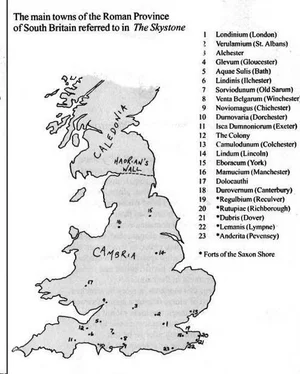Britannicus, however, had other ideas, and they involved me. On leaving his conference, I had called a meeting of all the centurions in the cohort. There were twenty of them, not including myself. I asked each of them to pick the five best all-round soldiers in his unit of fifty men (the days when a centurion commanded a hundred men had been gone four hundred years). It wasn't quite that tidy, because some of them came up with six or seven, but within half an hour I had the names of one hundred and twenty of our very best.
I set the clerks to the job of drawing up a roster for this new maniple and chose two centurions to command it, sixty men apiece. I promoted ten of those men to decurion rank, retaining two who were already decurions, and then detailed ten centurions to assemble all of these bodies in full gear against the wall of the camp closest to my tent within half an hour. Having done that, I went to tell Britannicus that his "special unit" was being prepared.
He astonished me by having one of the smiths from the regimental armourer's quarters set up an anvil and a hammer at the assembly point. I stayed in his tent with him, sharing the briefing he was giving to young Cato, one of the subalterns, whom he had promoted to command the new maniple. When a decurion stuck his head into the tent to tell us that the men were all assembled, Britannicus himself came with us to address them.
The new 120-man detail stiffened to attention as we approached. The two centurions had them drawn up into their two divisions of 60 men each; ten ranks by six files. Apart from the far-off whoops and yells of the enemy outside the camp, there was utter silence. Britannicus eyed them and, cool as a spring breeze, inspected each of them. When he had finished his inspection he returned to the front and faced them, picking up the hammer from the anvil and swinging it over his head to bring it smashing down onto the flat surface. He knew then that he had everyone's attention.
"Watch the hammer!" He swung it again. "It bounces back from the surface. Watch it!" Again he swung, hard.
"The harder the blow, the more complete the rebound. And anything between the surfaces gets smashed. Now. Watch this." He took off his cloak and held it up in front of him, in his left hand.
"I could swing a hammer at this all day and it would be a total waste of time and effort." He did so, and the cloth slipped easily over the hammer head. But then Britannicus put down the hammer and began to fold the cloak again and again upon itself, until it was reduced to a compact wad of wool that he held high in his left hand, taking the hammer again in his right. He let the wad drop, swung the hammer and knocked the cloak a good fifteen feet.
"When it is folded, as you just saw, it becomes solid enough for me to hit it and move it." He paused, waiting for the message to sink in, and then continued, his voice never rising beyond an intimate but very powerful pitch, audible to all of the soldiers of the new maniple.
"There are thousands of bare-arsed hostiles just outside this camp dreaming of slitting our throats. They are a rabble, an undisciplined mob. But they love to fight, and they think they know how it's done. They don't!
We are going to teach them how it's done. You are going to teach them how it is done. I have already taught you. You men are going to hammer these people until the concussion blinds them. You are going to hit them hard, compressing them and folding them back on themselves until the power of your blows is multiplied a hundred times by their density. Jam them together tightly enough, and you'll take away their power to strike back at you. Once you have them jammed together, compacted just like my old cloak here, you will hit them and rebound, just like that hammer head, ready to hit them again."
There was total silence in the ranks as he continued. "Before Julius Caesar reorganized his legions into cohorts, the maniple was the main striking force of the Legion. The maniple. A hundred and twenty men, just like you, fighting in twelve squads often men each. Each ten-man squad performed and manoeuvred just like a modern maniple, except that it was one-twelfth of the size." He paused and waited for his message to infiltrate the minds of the men listening to him. "Tonight, we are going to resurrect those tactics. Don't worry about it. You have been training for this for the past three years. You just didn't know it. Those heathen helots outside won't know what's hit them."
Another measured pause before he continued. "You will fight in three lines of four squads each, one behind the other, with gaps between the front line squads wide enough to accommodate the squads of the second line when it moves forward and the first falls back. As the front line falls back, the third line will advance at the charge to fill in the front line gaps. The first line, now in the rear, will then swing right and left to form the sides of a box, and you will then make a fighting retreat, protected by the mounted archers who will come out of the camp gates to cover your withdrawal. Nothing new — you've done it all before, in training. Just remember: Your purpose is to hammer. To deliver hard, unexpected attacks of short duration from any and all of the four camp entrances. Your intent will be to terrorize and demoralize the enemy.
"Remember, too, that your discipline makes you both unmatchable and unbeatable. The enemy fights in single combat. Every one of them is alone. You men, on the other hand, fight like a machine. There is little human about you. I expect you to get into their ranks quickly, hit them hard and then get back to the safety of these walls. Intact." His eyes moved from face to face.
"Upon re-entering the camp, you will rest for an hour and then hit them again from the other side." Again he paused before going on. "This is not an easy assignment, but each of you has been chosen as the best man in ten. You'll be tired by dawn, but you will be relieved of daytime duties. Remember, your prime purpose in this exercise will be to confuse and panic the enemy, to undermine his confidence." He stopped and looked them over carefully. "Is there any man here who does not want this duty?" Silence.
"This is your last chance."
Nothing.
"Very well, then. Hammer them!" He spun on his heel and stalked off. The new commander cleared his throat. Britannicus had not introduced him. The men were watching him. He coughed again.
"My name is Cato. I am now in command of this maniple. We will reassemble here in full armour half an hour before midnight. Centurion, dismiss the men."
I did, and they broke up gradually, talking among themselves. In five minutes I was alone, looking at the hammer and the anvil. Well, Britannicus's plan for the hammering worked. It worked so well that first night that in four raids we lost only three men, all three wounded and none seriously. The men were exhausted and slept all morning, the company clerks having rearranged the duty rosters to free them for "special services." When the enemy attacked at dawn, the "Hammers" were already under blankets, and there they remained. The rest of the cohort had little trouble holding off the attacks; our walls and ditches were high enough and deep enough to discourage all but the most foolhardy attackers, and they were easy pickings for the bowmen on our walls. The second night, about an hour before midnight, Britannicus split our cavalry into two groups of thirty and sent them off in opposite directions from the east and west gates of the camp, with orders to gallop at full speed through the enemy, keeping the camp walls within easy reach. The effect was magnificent. Each group charged out of the darkness, trampling bodies and creating chaos that hardly had time to settle before the second squadron arrived from the same direction. Each squadron made one and a quarter revolutions of the camp, re-entering by the gate beyond the one from which they had left. They lost four men.
Читать дальше









